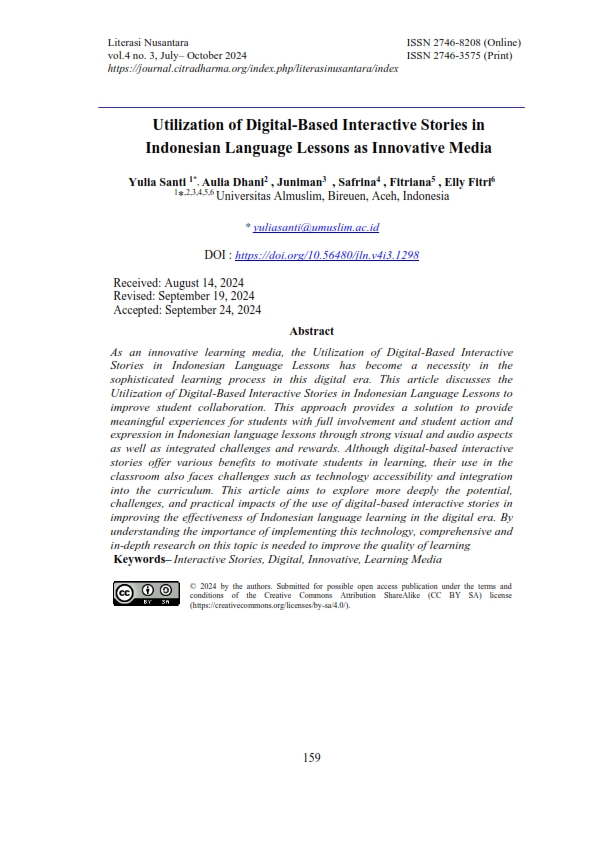Utilization of Digital-Based Interactive Stories in Indonesian Language Lessons as Innovative Media
DOI:
https://doi.org/10.56480/jln.v4i3.1298
 Abstract View:
Abstract View:
46
 PDF downloads:
PDF downloads:
33
Keywords:
Interactive Stories, Digital, Innovative, Learning MediaAbstract
As an innovative learning media, the Utilization of Digital-Based Interactive Stories in Indonesian Language Lessons has become a necessity in the sophisticated learning process in this digital era. This article discusses the Utilization of Digital-Based Interactive Stories in Indonesian Language Lessons to improve student collaboration. This approach provides a solution to provide meaningful experiences for students with full involvement and student action and expression in Indonesian language lessons through strong visual and audio aspects as well as integrated challenges and rewards. Although digital-based interactive stories offer various benefits to motivate students in learning, their use in the classroom also faces challenges such as technology accessibility and integration into the curriculum. This article aims to explore more deeply the potential, challenges, and practical impacts of the use of digital-based interactive stories in improving the effectiveness of Indonesian language learning in the digital era. By understanding the importance of implementing this technology, comprehensive and in-depth research on this topic is needed to improve the quality of learning
References
Alqahtani, M. (2015). The importance of vocabulary in language learning and how to be taught. International Journal of Teaching and Education, III(3), 21–34. https://doi.org/10.20472/te.2015.3.3.002
Ayu, D. P. 2020. Pembelajaran bahasa Indonesia berbasis e-learning di era digital. Prosiding SAMASTA: Seminar Nasional Bahasa dan Sastra Indonesia. 56 61.
Chan, F., Budiono, H., dan Setiono, P. 2019. Pengembangan multimedia interaktif dan instrumen penilaian berbasis keterampilan proses dasar di sekolah dasar. ELSE (Elementary School Education Journal): Jurnal Pendidikan dan Pembelajaran Sekolah Dasar. 5(1), 9-17. https://doi.org/10.30651/else.v3i1.2330
Devista, J. R. dan Kadafi, T. T. 2021. Pemanfaatan laman web make beliefs comix dalam pembuatan media pembelajaran bahasa Indonesia berbasis komik digital. Jurnal Pendidikan. 30(2), 153-164. https://doi.org/10.32585/jp.v30i2.1531
Li, L. dan Walsh, S. 2011. Seeing is believing: looking at EFL teachers’ beliefs through classroom interaction. Classroom Discourse. 2, 39-57. http://dx.doi.org/10.1080/19463014.2011.562657
Maisarah. 2022. Urgensi pengembangan media berbasis digital pada pembelajaran bahasa Indonesia. EUNOIA (Jurnal Pendidikan Bahasa Indonesia). 2(1), 65-75.
Murad, T., Assadi, J., dan Badarni, H. 2023. Digital Storytelling and EFL Speaking Skill Improvement. Journal of Language Teaching and Research. 14(5), 1189-1198. https://doi.org/10.17507/jltr.1405.06
Payanti, D. A. K. D. 2022. Peran komik digital sebagai media pembelajaran bahasa yang inovatif. Sandibasa I (Seminar Nasional Pendidikan Bahasa dan Sastra Indonesia I). 1(1), 464-475.
Syilviana, I. S. dan Qurrotani, L. 2024. Pengembangan media pembelajaran berbasis komik digital pada materi peninggalan sejarah kelas IV SD. Jurnal Pedagoik Pendidikan Dasar. 11(1), 1-9.
Widiastini, N. K. 2021. Pengaruh literasi digital melalui pemanfaatan melajah.ID terhadap hasil belajar membaca. Jurnal Pendidikan dan Pembelajaran Bahasa Indonesia. 10(2), https://doi.org/10.23887/jurnal_bahasa.v10i2.723 219–228.

Downloads
Published
How to Cite
Issue
Section
Categories
License
Copyright (c) 2024 Yulia Santi, Aulia Dhani, Juniman, Safrina, Fitriana, Elly Fitri

This work is licensed under a Creative Commons Attribution-ShareAlike 4.0 International License.
Copyright Notice
Authors who publish with this journal agree to the following terms:
- Authors retain copyright and grant the journal right of first publication with the work simultaneously licensed under a Creative Commons Attribution-ShareAlike 4.0 International License that allows others to share the work with an acknowledgment of the work's authorship and initial publication in this journal.
- Authors are able to enter into separate, additional contractual arrangements for the non-exclusive distribution of the journal's published version of the work (e.g., post it to an institutional repository or publish it in a book), with an acknowledgment of its initial publication in this journal.
- Authors are permitted and encouraged to post their work online (e.g., in institutional repositories or on their website) prior to and during the submission process, as it can lead to productive exchanges, as well as earlier and greater citation of published work (See The Effect of Open Access).

This work is licensed under a Creative Commons Attribution-ShareAlike 4.0 International License.





























